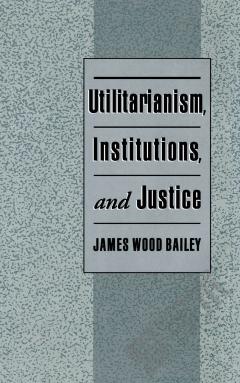Utilitarianism, Institutions, and Justice
This compelling book advances utilitarianism as the basis for a viable public philosophy, effectively rebutting the common charge that, as moral doctrine, utilitarian thought permits cruel acts, justifies unfair distribution of wealth and demands too much of moral agents. Bailey defends utilitarianism through novel use of game theory insights regarding feasible equilibria and evolutionary stability, elaborating a sophisticated account of institutions that real-world utilitarians would want to foster. A provocative attempt to support the practical use of utilitarian ethics in a world of conflicting interests and competing moral agents, Bailey's book employs the work of social scientists to tackle problems traditionally given abstract philosophical attention. He shows that utilitarianism, while still a useful doctrine for criticizing existing institutions, is far more congruent with ordinary moral common sense than has been generally recognized.
{{comment.content}}








 京公网安备 11010802027623号
京公网安备 11010802027623号